Activists Retreat
Activists Retreat The Sahiyo Activist Retreat aims to bring together ‘activists’ who speak out against Female Genital Cutting (FGC) – people who work either publicly or anonymously to raise community and social awareness regarding the importance of ending the harmful practice of FGC. The first Sahiyo Activist Retreat occurred in the U.S. and India in 2018. The retreat now occurs annually. apply to the 2025 retreat View Program Overview Read 2018-2022 Impact Report Read U.S. 2024 Activists Retreat Report Sahiyo understands that social change requires the efforts of many, all motivated by the same goal. As a result, we collaborate with individuals, organizations, and coalitions to build a community passionate about ending the practice of FGC. Sahiyo also actively recognizes that many advocates to end FGC work in isolation. The Sahiyo Activist Retreat aims to bring together these individuals and build a network of Bohra activists by: Strengthening our relationships and connections with one another. Sharing best practices and providing tools for activists to utilize in their advocacy work to bring awareness to and end FGC. The retreats provide an opportunity for advocates and activists to engage in an open and honest discussion regarding the challenges and opportunities they have experienced in their advocacy work against FGC. Read about participants’ experiences at Sahiyo’s Activists Retreat History and Impact: In 2017, Sahiyo circulated a Needs Assessment Survey to anti-FGC activists and advocates. We found that discussion among anti-FGC activists and advocates helps to further the understanding of challenges of working towards ending FGC, and the means of overcoming them. Since 2018, Sahiyo has hosted annual Activist Retreats as a result of these findings. The Sahiyo Activist Retreat encourages activists and advocates who have long worked in isolation; to connect with one another, to strengthen the network of anti-FGC activists and advocates, to share best practices and tools for advocacy and activist work, and to encourage the creation of collaboration between retreat attendees. Since the program’s inception; Sahiyo has trained more than 70 advocates, who have all gone on to: Organize and host workshops aimed at raising awareness of FGC Participate and engage in outreach campaigns with communities Provide testimony at policy briefings on FGC in various states Check out reports from our previous retreats: – Sahiyo U.S. 2021 Activists Retreat (Virtual) – Sahiyo U.S. 2019 Activists Retreat (Brooklyn, NY) – Sahiyo U.S. 2018 Activists Retreat (Brooklyn, NY) U.S Activists Retreat 2024 (Virtual) U.S Activist Retreat 2023 U.S Activist Retreat 2022 – Virtual U.S Activists Retreat 2020 (Virtual) U.S Activist Retreat 2019 India Activist Retreat 2019 U.S Activist Retreat 2018 India Activist Retreat 2018 Support our Activists Retreat Program
Sahiyo Partner Spotlight: Global Woman P.E.A.C.E. Foundation
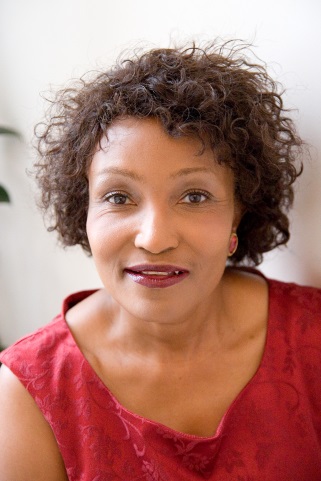
Global Woman P.E.A.C.E. Foundation (GWPF), a 501c3 nonprofit organization, was founded on the principles of ending violence and injustices against women and girls. Founded in 2010, the Global Woman organization merged with another organization called P.E.A.C.E. (People Everywhere All Created Equal); the name was officially and legally changed to Global Woman P.E.A.C.E. Foundation. The mission of the organization is to empower women and girls through education to help eradicate gender-based violence with sole focus on female genital mutilation/cutting (FGM/C). GWPF created the Walk To End FGM, the first of its kind in the United States since 2014. GWPF’s programs include Wholesome Organic Relief (restorative surgery, counseling, group-support, assistance with immigration); Kids Reach Shield (training law enforcement, teachers, school nurses, and the community); Just4You (international – scholarships and distribution of sanitary pads for girls in Africa). In 2017 and 2018, the organization was instrumental in getting legislation passed to have FGM/C criminalized in Virginia. In 2019, GWPF worked to get legislation passed in Virginia to include FGM/C in the Family Life Education curriculum for middle and high school students. The organization was involved in the crafting of federal bill H.R. 6100, which will amend the 1996 original federal law against FGM/C. 1) When and how did you and your organization first get involved with Sahiyo? I recall reading Mariya Taher’s story on ABC News, and it left me astounded. I thought she was so brave to come out with her story and share it with the world. I contacted her and asked if I could have permission to republish her story in our newsletter. She immediately responded and agreed. I had no idea that it would be the start of a long-lasting relationship. My organization presented Mariya with our Global Woman Award in October 2017 in the category of Survivor Activist. Mariya has attended several of our annual events, she has volunteered with us, served on our awards nomination committee, and partnered with us. 2) What does your work with Sahiyo and the Global Woman P.E.A.C.E. Foundation as a joint partnership involve? Global Woman P.E.A.C.E. Foundation and Sahiyo collaborate with each other’s events, attend and support each other’s events, give recommendations and referrals, collaborate on grant applications, and also fundraise together. 3) How has your involvement with Sahiyo impacted your own organization’s work? We have had the opportunity to meet and connect with others in Sahiyo’s circle of advocates, and an opportunity to participate in the popular Voices to End FGM/C storytelling program Sahiyo runs. It was quite an enlightening experience for me. Knowing Mariya and building a relationship with her and Sahiyo has left a great and positive impact on me and the work we do at GWPF. Because I had studied World History and World Geography in my native Liberia, I was very familiar with India as a country. But Mariya and Sahiyo opened my eyes to a different view when I read her story in ABC News and discovered the Bohra community of India. 4) What words of wisdom would you like to share with others who may be interested in supporting the Global Woman P.E.A.C.E. Foundation, Sahiyo and the movement against FGM/C? Get involved by volunteering with our organizations. Help us raise funds to support our programs. Sahiyo and GWPF share commonalities and both organizations began at the grassroots level. We run our organizations with a great deal of passion. Passion comes from caring, and care is what we have for the girls and women affected by the practice of FGM/C. We need to see more of the audacity that it takes to speak out to the world about the practice of FGM/C. Why don’t you get involved and join us? Thank you.
Digital advocacy: The future of activism for survivors and activists

by Sandra Yu Activism is the policy or action of using vigorous campaigning to bring about political or social change. Prior to Sahiyo, I thought to be an activist was to be loud. Anything less than protests and demonstrations picketing for change outside the White House was not really activism. Actionable change came from legislation and policy changes. I scoffed at digital activism – trending hashtags and posting black squares on Instagram didn’t mean you were an activist. At Sahiyo as a programs intern, I gained a new appreciation for storytelling and digital advocacy as forms of healing and activism, respectively. In contrast to the physical mobilization of masses in protests, picketing, and policy-based activism, storytelling is a distinctly emotional and psychological mobilization. I remember watching my first Voices to End Female Genital Mutilation/Cutting (FGM/C) video – Change by Rhobi Samwelly. She shared her story in the short span of 3 minutes and 51 seconds, and in that short period of time, I felt as if I had visualized her pain, trauma, and conviction to end FGM/C. It is through storytelling that one will understand the need for activism; the picketing will come later. Storytelling is particularly impactful in activism against FGM/C. As a harmful and pervasive social norm in many cultures, FGM/C is silently maintained across generations under the guise of cultural normativity. To break the culture of silence is to risk ostracization from their families and communities. Yet, many survivors have taken that plunge and have engaged in storytelling to protect future women from being cut. As allies, it is our job to amplify their stories so that more people may hear them and become inspired to create change. I recently attended a webinar that spoke about how we can best amplify voices through digital advocacy. Digital Storytelling and Advocacy: How Stories Can Support Progressive Change was hosted by StoryCenter and moderated by Amy Hill; one of Sahiyo’s co-founders, Mariya Taher, presented on the Voices campaign as a panelist. In the webinar, Amy speaks about the need for storytelling as an avenue of advocacy. She presents research on how telling and listening to stories can increase self-esteem and wellbeing, help communities bond and become politicized, and inspire people to take action for change. I translate that as storytelling allows for transformation. It allows survivors and community members to transform the trauma of FGM/C on their bodies and mental health into a point of connection with others of the same community. Across activist communities, storytelling allows for a transformation from discomfort to vulnerability. Isabel, another intern at Sahiyo, wrote about her experience with StoryCenter and Sahiyo’s co-hosted webinar, Intersecting Stories, where she engaged in intimate storytelling that glimpsed into “the magical nature of storytelling – how words weave friendships, trust, and respect.” I believe storytelling has a way of transcending the individual to bind communities together through shared values and experiences. In the current age of digitization, we see stories framed in a variety of mediums such as Instagram, Twitter, and Facebook. While it may be easy to get lost in trends, hashtags, and stories in digital activism, I find that digital advocacy is equally powerful as traditional media in allowing us to amplify the voices and stories of survivors. The process of connecting people and communities across the world through a screen is an important concept to develop. I’m proud to be a part of an organization that creates change through digital advocacy and storytelling.
Orchid Project releases report detailing the pandemic’s impact on female genital cutting
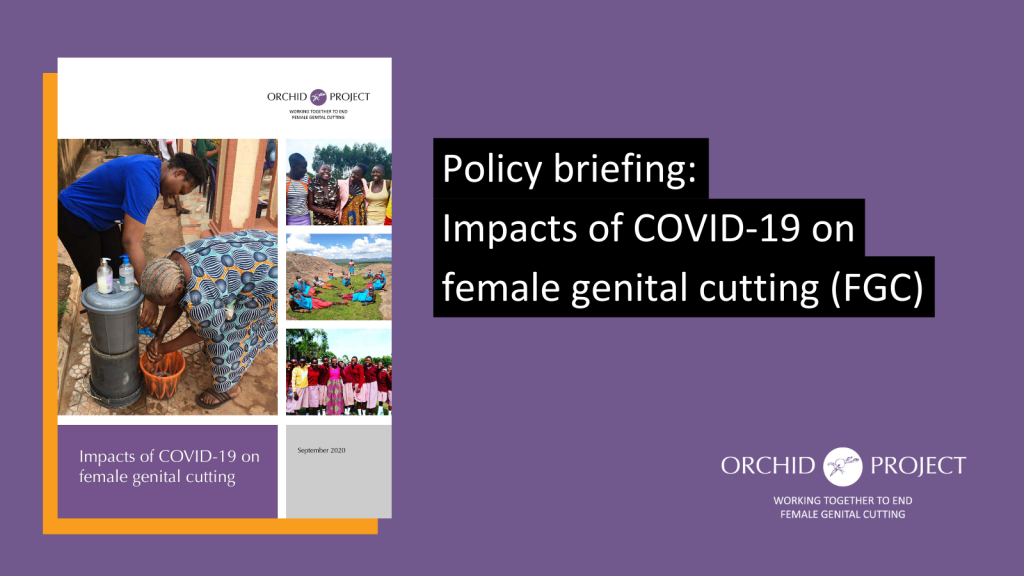
By Hunter Kessous Reports of an increasing rate of female genital cutting (FGC) began early in the pandemic. We are now nine months into the lockdowns and school closures, which have propagated the cutting of young girls. In response, the Orchid Project, decided to further investigate the impact of COVID-19 on the practice of FGC and the movement to end it. The Orchid Project is a nongovernmental organization based in the United Kingdom advocating for the end of FGC globally. Throughout the summer, various grassroots organizations and non-governmental organizations have hosted webinars elucidating the effects of COVID-19 on specific organizations. Sahiyo has shared blog posts reflecting on some of these webinars, which have focused on work in Nigeria and Kenya. There are some key pieces of information shared between these webinars and the Orchid Project’s reports. For example, COVID-19 induced lockdowns and school closures are creating opportunities for FGC to be performed undetected. When girls stay home, they are automatically at a greater risk of undergoing FGC. Furthermore, safe spaces, such as shelters and mental health services, have been closed down. Even medical attention is difficult for FGC survivors to receive, as resources have mainly been diverted to the pandemic. Lack of essential health services and safe spaces for girls and women is a serious concern. According to the report, “Resourcing and programming to end the practice in Asia are extremely limited, so the impact of the COVID-19 pandemic on activities to end FGC have been less significant than in West and East Africa.” The report gives an alarming account of how economic hardship caused by the pandemic has also led to an increase in FGC. In some communities, girls who have been cut are often seen as more marriageable and receive higher bride prices. The bride prices can then be exchanged for food and essential supplies, which has motivated families to cut their girls in this time of extreme economic hardship. Another economic factor involves former cutters who have been returning to the practice, in need of the compensation it will provide. In addition to affecting the practice of FGC, there have also been drastic effects on the movement to end FGC. Nearly all of the groups that were interviewed by Orchid Project for the report have experienced severe restrictions on programming due to stay-at-home and distancing orders. Many organizations have responded by shifting their programming to virtual and media-based formats. However, this is not without its own challenges. Unequal access to technology and internet, along with the often high prices of radio and television communication, have been major obstacles to continuing community dialogues about FGC. The greatest need that the grassroots organizations are currently facing is urgent, flexible emergency funding. This is not to say that the grassroots organizations have not adapted to the dilemmas created by COVID-19. There have been many creative approaches to continuing their important work. Some in-person programming has continued with social distancing and the use of personal protective equipment. WhatsApp and social media platforms are being used to share key information, stimulate dialogues, and share podcasts. Hotlines have been created for at-risk girls; and some activists are even housing these girls in their own homes. The movement to end FGC has certainly taken a hit, but it is not without hope, thanks to the ingenuity and dedication of grassroots activists worldwide. Read the full report by the Orchid Project.
Asia Network to End FGM/C calls for your participation

Malaysian NGO Asian Pacific Resource and Research Centre for Women (ARROW) and British charity Orchid Project are jointly developing a new Asia Network to End FGM/C, to strengthen movements to end the practice of FGC in Asian communities. To shape this network and its priorities, all interested organisations, activists, and stakeholders working in the region on FGM/C or related issues in Asia are invited to fill out this consultation survey. The closing date for this survey will be 22nd December 2019.
Sahiyo’s New Video Campaign: No More Female Genital Cutting -Volunteers Share Their Stories
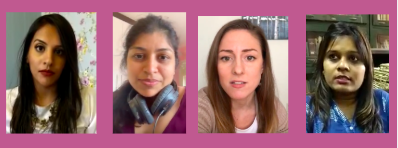
As April is known as Sexual Assault Awareness month, as well as a National Child Abuse Prevention Month and Female Genital Cutting (FGC) is an issue which lies at the pivotal intersections between these two issues, Sahiyo has begun a campaign to highlight why the Sahiyo community is working to both support survivors of FGC as well as to work towards preventing FGC form occurring to future generations of girls. Sahiyo reached out to our community of volunteers- spanning the globe, from Bahrain to Boston, and asked them to share their thoughts on their activism to end FGC, and why this issue matters to them. Throughout the month, short videos made by our Sahiyo community will be shared via social media. These voices belong to our volunteers, staff, advisory board and storytellers, each of whom has a different history and experience or knowledge of FGC – from beginning volunteers to more experienced advocates Do help us share this tapestry of powerful voices that are part of the ‘No More FGC- Volunteers Share Their Stories’ campaign by sharing these videos with your own networks. Find them on Sahiyo’s Youtube or Facebook today!
Experiencing Sahiyo’s Activist Retreat in Mumbai
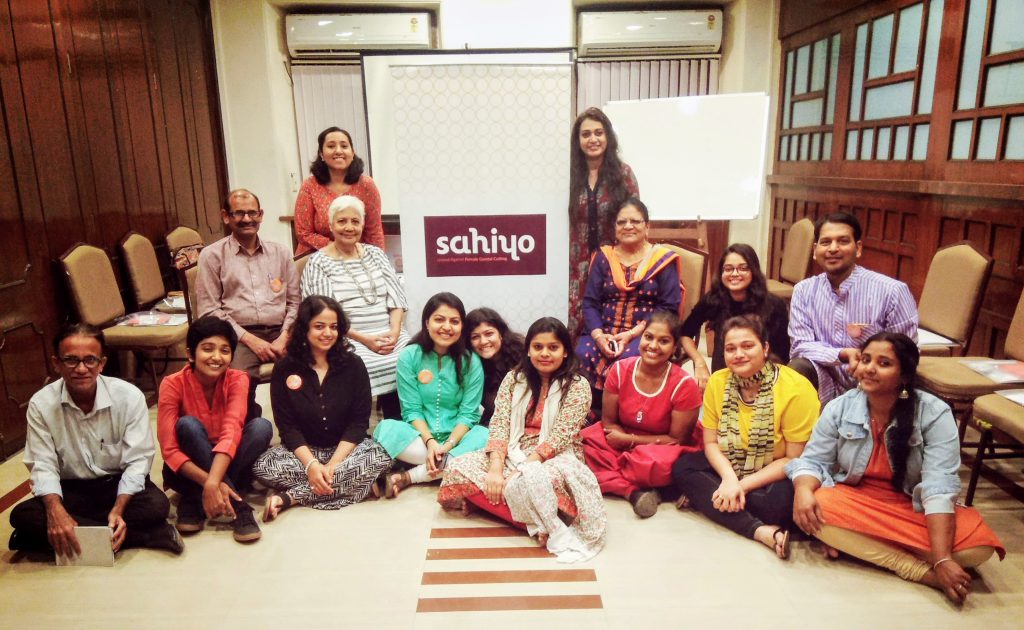
By Xenobia Country of Residence: India There are those who talk about change, and then there are those who do things and bring about the change. I would like to tell you about the time I decided to be a part of the Sahiyo’s Activist Retreat in Mumbai, and met such wonderful people who, in my eyes, were nothing short of superwomen. I cannot even begin to describe how amazing it is to meet like-minded people all driven by the same cause. It is honestly inexplicable. In today’s times, do you know what good, honest peer support feeling is like? Let me tell you: it was out of this world amazing! Did a couple of seemingly insignificant days change my life? Yes, they did. Prior to this event, was I feeling anxious and apprehensive about what it would turn out to be like? Oh, extremely. Was I nervous? Yes. Was I also curious about what would I take away from this retreat? Yes. Did I think it was going to be all about a bunch of women getting together to purely rebel against a cause? I will admit, yes. I knew about Sahiyo, and the cause that they are fighting for. I admired and respected them because I had been fighting for the same cause all my life, too, but silently. Many members of the Bohra community do not react well to independent thinkers, so it takes a lot of courage and true liberation to speak your mind on a public platform. Naturally, one ‘black sheep’ tends to have heard about the other. But immense respect for them aside, I was partly curious about what I would really learn here, and partly interested in what could be done to rightly channel the feelings I felt toward the people who endorse female genital mutilation (FGM). Needless to say, I couldn’t stop talking about this retreat when I returned home! There were some brilliant, fantastic people there from all walks of life, sharing their experiences, sharing their stories and how they heard of FGM, how it has impacted their lives, and what they are doing about it. Our co-hosts Insia and Aarefa were warm as ever, right from introductions and group bonding activities, to efficiently addressing counter arguments and introducing us to a world of relevant introspection, as opposed to traditional garish rebelling. There was also a talk given by a reputed gynaecologist, where we learned so many essential truths about the details of FGM that no one else talks about. So enlightening! It was as if there was a strange connection between all of us toward the end of the program. It’s not news that Bohras suffer from a major identity crisis anyway, considering most cultural aspects are borrowed from different parts of the world with no real roots anywhere. For someone who always found it hard to really fit in anywhere, it was as if I had found home at last. In spite of everyone at the retreat coming from such different backgrounds, locations and mindsets, it was really amazing. I, personally, have always felt very strongly about FGM/C and the concept of a random third person deciding what should be done with my body without my consent. But this experience and interaction has not only changed the way I see things, but has also made my resolve and conviction stronger – about fighting for every girl child out there, subjected to any such torture and abuse, until I have no life left in me, irrespective of how long it takes. For showing me how to efficiently channel all that I feel toward all forms of injustice done to women, and for this beautiful chapter of my life, I will be forever grateful to Sahiyo.
Mariya Receives Human Rights Storytellers Award
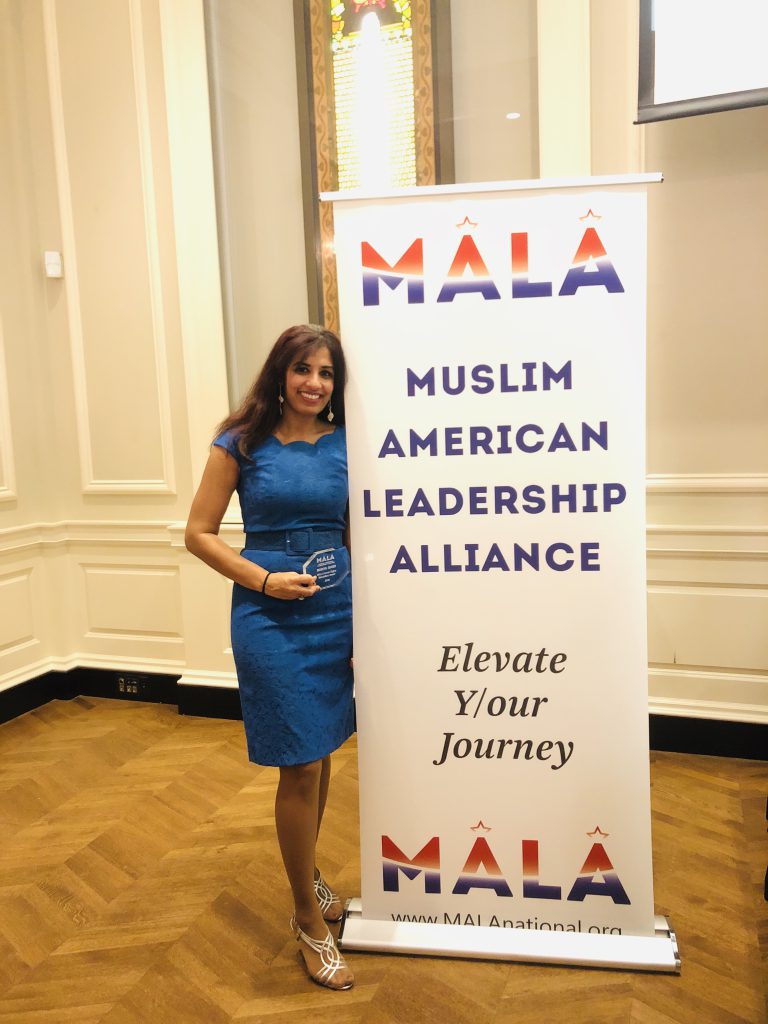
The Muslim American Leadership Alliance (MALA), a civic and community organization committed to promoting individual freedom and diversity, and to celebrating Muslim American heritage, honored Sahiyo Co-founder, Mariya Taher with the first annual MALA Human Rights Storytellers Award. This award recognizes Mariya and Sahiyo’s outstanding contribution to defending human rights through storytelling, in particular, working to protect women’s bodies from cutting – and bringing together women who have been cut on a journey of healing and empowerment. The award was given in recognition of the U.S. Sahiyo Stories project and the Human Rights Storytellers Award was presented to Mariya at MALA’s Third Annual Gala at the Chicago History Museum on November 6, 2018. Read more at MALA’s Third Annual Gala Honors Leaders, Storytellers.
Global Women P.E.A.C.E Foundation 5K Walk Against FGM
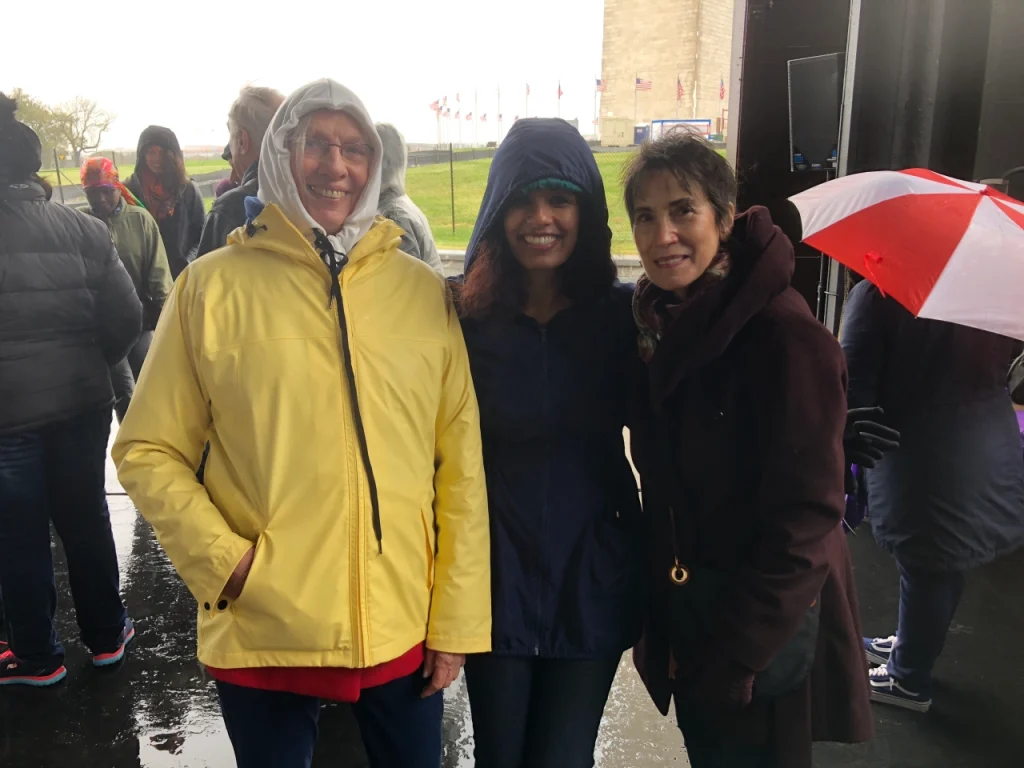
Each year, the Global Women P.E.A.C.E. Foundation hosts a 5K Walk Against FGM in Washington, D.C., and activists working to end FGC around the world come to participate. This year, the event was extended to 2-days and commenced with a Global Woman Awards ceremony on Friday, Oct 26th at the Milken Institute of George Washington University. Two of the award recipients, included Maria Akhter and Severina Sangurikuri, two women who took part in the U.S. Sahiyo Stories project. They each received a Global Woman Awards from the Global Woman Peace Foundation in the categories of Student Ambassador and Survivor Activist respectively. Here’s what Maria has to say about receiving her award: [blockquote/]I am thrilled, honored and humbled to receive the Global Woman Award in the Student Ambassador category from the Global Woman Peace Foundation. With boundless support from friends, family, and the hardworking activists in Sahiyo and other organizations working to end FGM/C, I’ve been able to turn my quiet interest in activism into a bold passion and lifelong commitment to a cause I hold near and dear to my heart. Receiving this award reinforces and challenges me to continue working in new ways to break the silence around FGM/C and end the practice for future generations.[/blockquote] The 5K Walk, scheduled for October 27th was at the last minute cancelled due to severe winds and rains. Yet, prior to the walk, people still gathered to listen to the guest speakers such as FGC survivor, Lola Oje from Nigeria who shared that she refuses to allow her beautiful daughter to be subjected to FGC. To learn more about the event, visit ‘A Mini United Nations Convenes in Washington, D.C.’
Aarefa Johari and Masooma Ranalvi discuss FGC at We the Women Bangalore

On October 7, Sahiyo co-founder Aarefa Johari and We Speak Out founder Masooma Ranalvi participated in a panel discussion on Female Genital Cutting in India, at the We the Women summit organised by veteran journalist Barkha Dutt in Bangalore. Prominent human rights activist Srilatha Batliwala moderated the discussion. The event was attended by more than 200 people in Bangalore and was streamed live on social media. Ranalvi and Johari shared their personal experiences of being subjected to FGC and discussed various aspects of the problem from the need to engage with the community to end the practice and the significance of a law against it. You can watch the complete video of the discussion here. The event was a follow up to a similar We the Women summit in Mumbai in December 2017, when Sahiyo co-founder Insia Dariwala spoke about the practice along with Mubaraka and Zohra, two survivors of FGC. You can watch last year’s video here.
